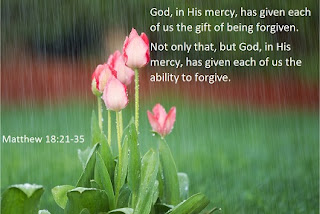God, in His
mercy, has given each of us the gift of being forgiven. Not only that, but God, in His mercy, has
given each of us the ability to forgive.
Actually,
we’re given not just the ability but also the responsibility to forgive. Sometimes we may treat that responsibility as
a burden, viewing the act of forgiving as the price we pay so that we can be
forgiven. We do it grudgingly,
sparingly. We reserve the right to
rescind that forgiveness if the offending party offends again. Like Peter, we ask, “Lord, how many
times?” When Jesus responds, He says in
essence, “You’re asking the wrong question because you don’t understand. Don’t count.
Don’t sit in judgment, determining if the number or the severity of
transgressions exceeds the limit of what you’re to forgive. You’re being called to forgive far less than
God has already forgiven of you.” [Matthew 18:21-35]
Our being
forgiven is inextricably linked to our forgiving others. These are two sides of the same coin. Jesus must really want us to know this
because He states it more explicitly in two of His most famous teaching
episodes. His Sermon on the Plain
states, “Forgive, and you will be forgiven” [Luke 6:37]. In the Sermon on the Mount, He includes “forgive
us . . . as we forgive others” in the Lord’s Prayer, then immediately follows the prayer
with: “For if you forgive others their trespasses, your
heavenly Father will also forgive you; but if you do not forgive others,
neither will your Father forgive your trespasses” [Matthew 6:14-15].
Forgiveness
is an all or nothing enterprise. Jesus told
Peter (and us) not to bother with counting.
Just forgive, and keep forgiving, never partially or with limits, but repeatedly
and endlessly. We can’t dole out
forgiveness case by case or person by person.
We’re either someone who forgives or we’re not. Forgiving partially or conditionally is not
an option.
Don’t count
because that conflicts with forgiving.
Jesus commanded us to love one another as He has loved us [John 13:34],
and love keeps no record of wrongs [I Corinthians 13:4-6]. As long as we keep track, we still hold onto
the first (and second and third) wrongs done to us, and they’re festering,
ready to hurt us over and over. The mere
act of counting, of adding to the list, dredges up painful memories.
So forgiving,
instead of counting, is an act of obedience that yields immense benefits. Being able to forgive fully and completely isn’t
a burden, it’s a blessing. When we’re
able to forgive, we’re freed from feelings and forces that harm us and those
around us. We can let go of anger,
hatred, bitterness, hurt, even judgmental self-righteousness. Letting go frees us from those pains (and
from the chore of keeping count), and it allows us to change our focus away
from what was done to us so that we can recall the many good things done for
us. We may not feel that the person who
offended us deserves to be forgiven – but we deserve the blessing of being able
to forgive.


No comments:
Post a Comment